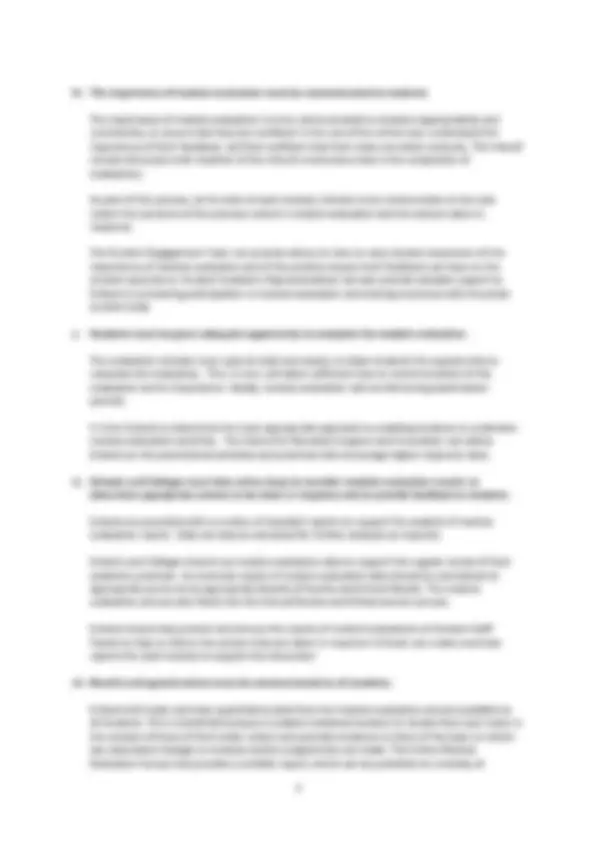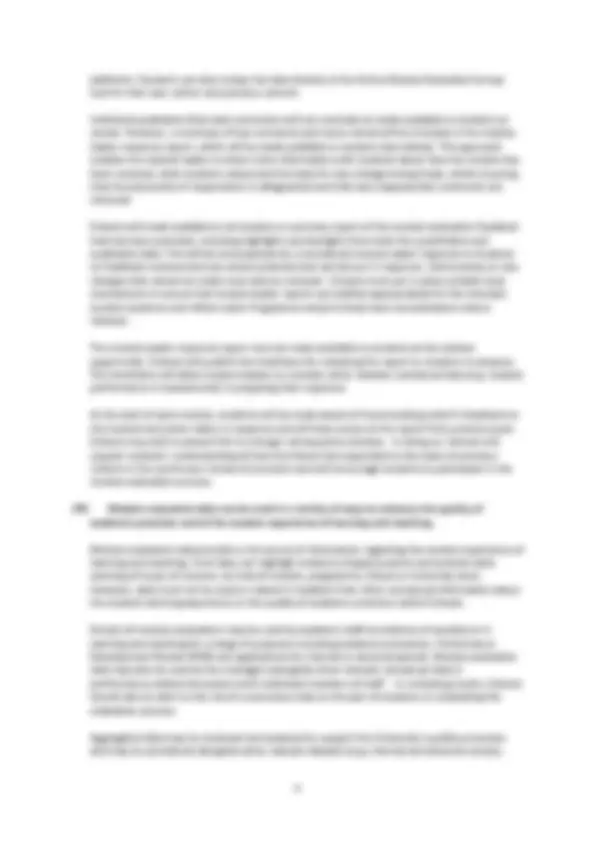





Study with the several resources on Docsity

Earn points by helping other students or get them with a premium plan


Prepare for your exams
Study with the several resources on Docsity

Earn points to download
Earn points by helping other students or get them with a premium plan
Community
Ask the community for help and clear up your study doubts
Discover the best universities in your country according to Docsity users
Free resources
Download our free guides on studying techniques, anxiety management strategies, and thesis advice from Docsity tutors
This policy sets out Cardiff University's approach to student evaluation of modules (and equivalent units for non-modular programmes) and the principles ...
Typology: Exams
1 / 7

This page cannot be seen from the preview
Don't miss anything!




Cardiff University MODULE EVALUATION POLICY
1. Introduction This policy sets out Cardiff University’s approach to student evaluation of modules (and equivalent units for non-modular programmes) and the principles that underpin it. It sets out a framework for module evaluation that defines the minimum requirements with which all Schools must comply and identifies when variation in practice may be appropriate to accommodate relevant differences in academic provision between Schools. The policy covers all taught programmes, including clinical non-modular programmes for which appropriate blocks of teaching and learning should be identified^1. 2. Key principles Cardiff University’s module evaluation framework is based on the following key principles: i. Module evaluation is a core element of the suite of practices and processes through which Cardiff University can be assured of the excellence of its academic provision. ii. The primary purposes of module evaluation are to: - Assist Schools in reviewing and enhancing their taught programmes through direct engagement with the views of current students; - Support staff in the continual improvement of their teaching practice; - Enable the University to review and enhance the student experience of learning and teaching, share evidence of good practice and identify areas for improvement. iii. Staff and students engage in module evaluation in a spirit of partnership and use the results constructively to support the continuous enhancement of academic programmes. iv. Schools work in partnership with students to ensure they have a clear understanding of the module evaluation process and its place within the University’s quality system and share with students the School’s response to their feedback. v. Student module evaluation data are held securely and are not reported in a way that could identify individual respondents. vi. Students complete module evaluations with consideration and respect and the module evaluation process is conducted in line with the University’s Dignity at Work and Study policy. 3. Cardiff University’s approach to module evaluation The UK Quality Code for Higher Education requires that “(t)he provider actively engages students, individually and collectively, in the quality of their educational experience”. Cardiff University regards module evaluation by students as a key element of its fulfilment of this expectation. The University’s module evaluation framework sets out the common requirements of all Schools. Schools are also encouraged to provide students with suitable opportunities to give informal in-module feedback. (^1) During 2018/19, the College of Biomedical and Life Sciences will undertake a focused piece of work to consider how best to gather student feedback on learning and teaching for non-modular clinical programmes and will bring forward a proposal to ASQC for a shared approach across the two programmes that is consistent with the key principles and requirements of this policy.
i. All Schools must undertake module evaluation for all modules or equivalent units for non- modular programmes. All undergraduate and postgraduate taught modules must be evaluated at least once per cohort. The minimum requirement is for one student module evaluation opportunity towards the end of the module. Schools should identify appropriate additional evaluation and student feedback opportunities during the module. The primary method for conducting module evaluation for ALL Schools is the University’s Online Module Evaluation Survey tool^2. The tool provides an easy to use interface for students, as well as a range of analysis and reporting options. Guidance and training on the effective use of the tool, including on how to maximize response rates, is available via the Centre for Education Support and Innovation. ii. All module evaluation questionnaires must use the agreed institutional core question set, to which may be added a limited number of further questions. In order to ensure comparability of data both over time and between modules, programmes and Schools, AQSC has agreed a core question set to be used across all academic Schools and Programmes (Appendix 1). The core question set will be reviewed periodically by ASQC to ensure ongoing fitness for purpose. From 2019/20, Schools will be permitted, if they wish, to insert up to three additional questions per module. The Centre for Education Support and Innovation can assist Schools in identifying and framing suitable additional questions. iii. Reporting will not identify individual students. Students must feel safe in the knowledge that they can express opinion without being identified. Schools should also exercise discretion when sharing free text comments made about individual members of staff in any forum other than within the module team or on a one-to-one basis with the member(s) of staff concerned. Redaction of free-text (qualitative) comments can be undertaken within the Online Module Evaluation Survey tool, if appropriate. The Online Module Evaluation Survey tool provides a mechanism through which inappropriate remarks made by students can be flagged and the respondent sent some general advice regarding more appropriate behaviour. This functionality can also be used in situations where respondents make a comment that raises concerns for their wellbeing or otherwise alerts the School to an issue that requires further action. Specific user rights are required to undertake this task that do not include the ability to identify individual respondents. Schools will need to allocate a specific member(s) of staff to the role. (^2) Schools must have in place contingency arrangements so that any exceptional circumstances (e.g. IT failure) do not compromise the consistent approach to module evaluation. Where it becomes necessary to implement contingency arrangements, Schools must first secure the approval of the relevant College Dean for Education and Students. Schools must also upload the data to the Online Module Evaluation Survey tool, to facilitate analysis and feedback to students in a consistent manner, and so that results can be used to support College and/or institution-wide trend analysis, where appropriate.
platforms. Students can also review the data directly in the Online Module Evaluation Survey tool for their own cohort and previous cohorts. Individual qualitative (free text) comments will not routinely be made available to students to review. However, a summary of key comments and issues raised will be included in the module leader response report, which will be made available to students (see below). This approach enables the module leader to share richer information with students about how the module has been received, what students valued and the basis for any changes being made, whilst ensuring that the anonymity of respondents is safeguarded and that any inappropriate comments are removed. Schools will make available to all students a summary report of the module evaluation feedback that has been provided, including highlights and lowlights from both the quantitative and qualitative data. This will be accompanied by a considered module leader response to students on feedback received and any actions planned and carried out in response. Commentary on any changes that cannot be made must also be included. Schools must put in place suitable local mechanisms to ensure that module leader reports are drafted appropriately for the intended student audience and reflect wider Programme and/or School-level considerations where relevant. The module leader response report must be made available to students at the earliest opportunity. Schools will publish the timeframe for releasing the report to students in advance. The timeframe will allow module leaders to consider other relevant contextual data (e.g. student performance in assessments) in preparing their response. At the start of each module, students will be made aware of the preceding cohort's feedback on the module and action taken in response and will have access to the report from previous year. Schools may wish to extend this to a longer retrospective window. In doing so, Schools will support students’ understanding of how the School has responded to the views of previous cohorts in the continuous review of provision and will encourage students to participate in the module evaluation process. viii. Module evaluation data can be used in a variety of ways to enhance the quality of academic provision and of the student experience of learning and teaching. Module evaluation data provide a rich source of information regarding the student experience of learning and teaching. Such data can highlight evidence of good practice and provide early warning of issues of concern, be that at module, programme, School or University level. However, data must not be used or viewed in isolation from other contextual information about the student learning experience or the quality of academic provision within Schools. Results of module evaluations may be used by academic staff as evidence of excellence in learning and teaching for a range of purposes including academic promotion, Performance Development Review (PDR) and applications for internal or external awards. Module evaluation data may also be used by line managers alongside other relevant contextual data in performance-related discussions with individual members of staff. In reviewing results, Schools should also be alert to the risk of unconscious bias on the part of students in completing the evaluation process. Aggregated data may be reviewed and analysed to support the University’s quality processes and may be considered alongside other relevant datasets (e.g. internal and external surveys,
equality and diversity, tariff, progression data) to inform institutional thinking regarding the student experience of learning and teaching. Appropriate reports will be shared routinely with relevant professional services to aid continuous improvement of services. Aggregated data will also be analysed periodically for equality and diversity purposes, in order to identify any specific issues regarding the experience of students or staff with protected characteristics. ix. Module evaluation data are held securely on the University network and are managed accordance with the University’s Information Security Framework. Details of the University’s Information Security Framework can be accessed at http://sites.cardiff.ac.uk/isf/.
Set cwestiynau gwerthuso modiwlau, 2018/ Templed safonol set cwestiynau Dysgu ac addysgu